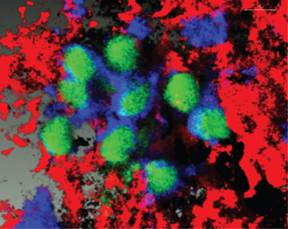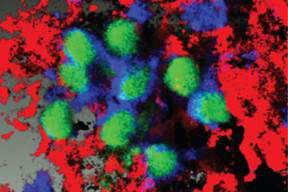
Immunology researchers at the University of Connecticut Health Center are learning more about memory T cells, which are cells that fight infection from a previously encountered antigen.
“This work shows that under normal circumstances, memory T cells ignore self-antigens, thereby prohibiting autoimmunity,” says Leo Lefrançois, Department of Immunology chair, whose laboratory developed a genetically modified mouse model that made the research possible. “However, when inflammation is introduced the memory cells can respond, helping to explain why infections can trigger autoimmune diseases.”
Memory T cells normally exist to protect from re-infection. But memory T cells also can cause autoimmune disease when they cross-react with self-antigens, sometimes triggered by infection.

An antigen is a substance normally foreign to the body that evokes an immune response and is bound by T cells. Autoimmunity can occur when T cells bind self-antigens.
Co-authors include Evan Jellison, assistant professor of immunology, Lynn Puddington, associate professor of immunology and medicine, former UConn Health Center postdoctoral fellow Michael Turner, and research assistants Elizabeth Lingenheld and Li Zhu. Their work is published in the Dec. 26 issue of the Proceedings of the National Academy of Sciences.
“These results have implications for relapsing remitting forms of autoimmune disease,” Jellison says, “as well as for cancer therapy where memory T cells might ignore tumor antigens but could potentially be triggered to attack the tumor.”
Follow the UConn Health Center on Facebook, Twitter and YouTube.



